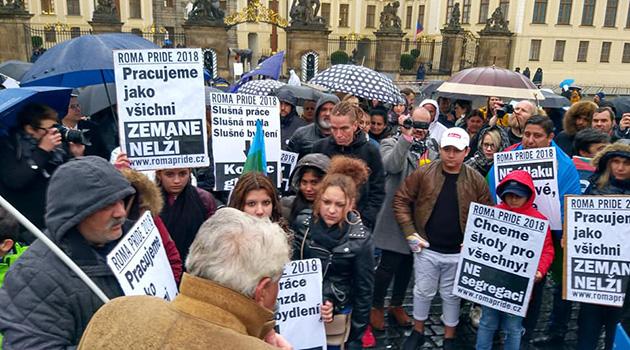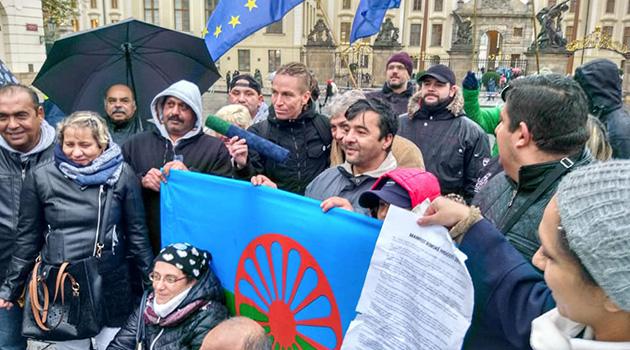It’s a pity that the Roma Pride march failed to make an impression on the Czech media. It deserved the attention of the broader public.
A brilliant event
Roma Pride is a brilliant event for several reasons. During this demonstration, Romani people tell the public they are proud of their Romipen and aware of their own traditions.
“We are proud of our Romipen, our culture, our families and our children,” the authors of the Roma Pride Manifesto 2018 write. Romani people from all over the country – Brno, Karlovy Vary, Krupka, Prague, Ústí nad Labem – meet up with each other on this occasion.
These people are then able to exchange their experiences. The event this year was predominantly attended by Romani people, almost 200 of them.
That turnout could be improved in the future if more associations would become involved with organizing the annual event. It is important that Romani people, through this initiative, appeal to the public and do their best to speak to them.
That communication is exactly what is missing in our society. The integration of Romani people from the ghettos (roughly half of all Roma in the Czech Republic) will never happen as long as people – mainly neighbors in impoverished areas – don’t begin conversing with each other and listening to one another.
To some this might appear to be too small of an aim, but this aspect of integration is just as important as the inclusion of Romani people into education, just as important as social housing, and just as important as are new job opportunities for the most impoverished or most indebted Romani community members whose lives are being destroyed by loan sharks. In the Roma Pride Manifesto 2018 the authors point out, among other things, that Romani people have not always just been victims, but that they actively joined the anti-Nazi resistance, for example.
Here the authors are communicating the fact that Romani people deserve credit for building our common state. This fact is not well-known by the public.
Discrimination, humiliation, and violence
The authors also touch on the state’s unfriendliness toward Romani people and the unfriendliness of part of society here, as well as on the fact that they have rights “just on paper” but that enjoying them in reality is a different matter. This comment is justified – from my own experience I know that the life of people in the ghettos here is horrible and that discrimination, humiliation and violence play the main roles in it.
Cities, municipalities and the state itself are to blame for that in large measure because of their arrogance and contempt, their relocation of Romani residents and their shaping of the ghettos, as well as the participation of various individuals working for the state administration in local mafia operations. Unfortunately, even Romani people who live absolutely unobjectionable lives in this country are unable to avoid the various punches being thrown by politicians at the minority as a whole.
In their closing, the authors of the Manifesto say they want change and that they are aware it will not happen without their own contribution: “Our wish is that this next century of Czech independence will deliver a change, that Czechs and Roma will find a common language and learn to live together. […] We must fight for our rights – we cannot rely on anybody giving them to us in the spirit of kindness. We are the only people who can change this situation. We must be heard and seen. We are the ones we have been waiting for.”
This makes a great amount of sense – Romani people should take their fate into their own hands and find a common language with Czechs. However, as we continue to demonstrate to ourselves, while this is the right way forward, it is not a simple one.
Acknowledgment of Romani errors was missing
What this Manifesto lacks is any acknowledgment of the errors that are committed by some Romani community members. Some of the Romani people living on impoverished housing estates do not show enough regard for their neighbors, a phenomenon that is also disliked by their fellow Romani residents, not just by their white neighbors.
For example, at night, when others want to sleep, some Romani people do make too much noise. Then there is the exploitation of impoverished people, predominantly Romani people, by local mafias with both Romani and white members.
The Roma are not managing to extricate themselves from this, to find a common language with everybody else and to combat the mafiosi alongside everybody else. In the ghettos, the predominant emotion is sometimes anger, which prevents us from attaining mutual agreement.
These mafias, to a predominant degree, rule the lives of the people they prey on. From their dominance flows the behavior that earns the mafiosi their profits even as the Romani people themselves destroy their own lives.
That behavior is drug use, petty crime, prostitution including child prostitution, etc. Why is it important to say these things out loud?
Because no discussion can happen unless people listen to each other and then respond by saying: “Yes, I hear what you are saying, and I acknowledge that you are right about some things, and I will do my best to correct that.” Without the pronouncement of sentences like this, which will certainly be heard from both parties if they really listen to each other, the inclusion of the Romani people living in the ghettos into the rest of this society cannot happen.
Romani people must acknowledge to themselves that as long as some members of their community bother other people here through their behavior, then those other people will not be bothered in the least when the Roma are systematically discriminated against. White people here must also acknowledge to themselves that as long as this wave of hate from their direction keeps crashing down on Romani people, and as long as the Roma are forced, every single day, to be subjected to being addressed in various discriminatory ways, then the Roma will have no reason to listen to the whites.
Discussion and listening to each other
This vicious circle can be broken by just one thing: Discussion, listening to each other at all levels – it will not be aided by dismissing or excusing bad behavior, and it will not be aided by repressing the people from the ghettos, as some politicians advocate. All of us must acknowledge that generalizations have no place in such a discussion.
Half of the Romani community members here live absolutely unobjectionable lives, and of the Romani people living in the ghettos, just a small minority do not behave nicely towards those around them. On the other hand, there are also many white people here who actually do have Romani people’s backs, because those white people have no tolerance for discrimination or racism.
This could be the basis for a mutual discussion. Maybe at the next Roma Pride more blacks and whites will join forces – not against anybody or anything, but in favor of better mutual coexistence.

